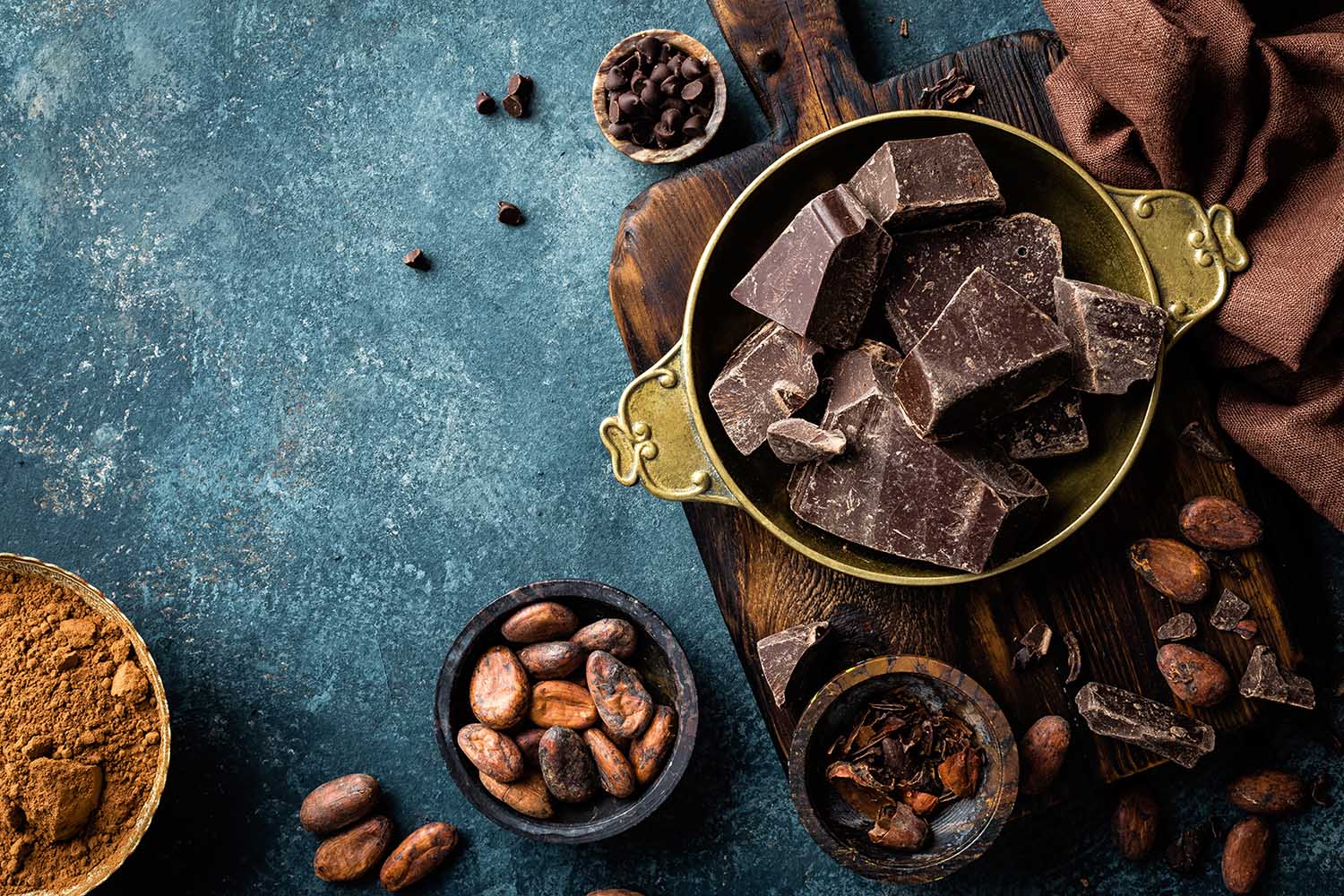Advertisement
The Delicious Health Benefits of Dark Chocolate
Treat yourself to the body-loving ways of this luxurious delight
Fact-Checked
This article has been written and fact-checked by experts in the field.

High in health-helping antioxidants
Looking for a sweet indulgence without derailing those health-conscious efforts? Reaching for a little dark chocolate could be the delicious solution. Eating just one to two ounces of dark chocolate—containing at least 70 percent cocoa solids—each day can support your health and satisfy that sweet tooth. You may be wondering how exactly this luxurious treat does good by your body. Read on to unwrap 10 health benefits of dark chocolate.

Cacao is rich in polyphenols, particularly flavanols—plant chemicals that provide antioxidant effects in your body. Natural cocoa (the roasted form of cacao that is used to make chocolate) retains the most of these flavanols, and dark chocolate contains as much as two to three times more cacao solids than milk chocolate. While processing can reduce the flavanol content in chocolate, some research shows that the flavanol content of dark chocolate could be more than five times that of milk chocolate.
Tones down inflammation

Chronic inflammation in the body has been linked to a wide range of diseases, including cancer, Alzheimer’s, diabetes, heart disease, and more. However, regular intake of dark chocolate has been shown to decrease this inflammation and the oxidative stress that causes it. This benefit can be largely traced to the potent antioxidant effect of cocoa’s polyphenol content. For more inflammation fighters that you can add to your diet, check out these 10 Food Swaps for Sidestepping Inflammation.
Good for heart health

Studies show that dark chocolate can help protect your heart with its flavanols’ antioxidant effects, which reduce cell damage linked to the development of heart disease. Research also shows that dark chocolate offers antithrombotic effects to help prevent blood clots, and works to relax blood vessels, lowering blood pressure in the process. If you want to know what else you can do to help protect your heart, these myths and truths about cardiovascular disease can help.
Lowers risk of diabetes

It may seem counterinitiative that a sweet treat could help prevent diabetes, but that seems to be one of the beauties of a regular ounce or two of dark chocolate. The flavanols is dark chocolate can help reduce insulin resistance, lowering the overall risk of Type 2 diabetes in the process. Of course, chocolate doesn’t always have to mean sweet; take a peek at the savory side of chocolate with these alive recipes.
Helps prevent cancer

Cocoa’s antioxidants act as free radical scavengers in your body. Free radicals have been linked to the aging process and development of cancer. As your body ages, its ability to defend against free radicals diminishes. However, antioxidants can help neutralize these free radicals. It perhaps comes as no surprise then that studies have found that cocoa and dark chocolate can help reduce the risk of certain cancers, such as colon cancer.
Improves vision

You may be starting to see dark chocolate in a whole new way, but it turns out it can also help you see better in general. Clinical tests have shown that people who ate dark chocolate had improved sight two hours after consuming it, compared to those who had eaten milk chocolate. This improved vision included “small enhancements in visual acuity and large-letter contrast.” While this is exciting news for your peepers, more research is needed into how long this vision improvement actually lasts.
Boosts immune system

Dark chocolate’s antioxidant effects can help your body better defend itself by stimulating your immune system. Research has found that eating dark chocolate can increase the expression of genes involved in the activation of T cells—the white blood cells that help your body fight off infection. Further, dark chocolate has been shown to help activate B cells—the white blood cells that make antibodies.
Aids in exercise

You may be pleased to find out that eating dark chocolate could actually be a help rather than a hinderance to your fitness goals and exercise routine. Research suggests that regularly eating dark chocolate can help lower oxidative stress and increase metabolic function after exercise, reducing muscle damage resulting from exercise in the process. One study also showed that eating dark chocolate daily for two weeks reduced the amount of oxygen needed for moderate intensity exercise.
Enhances brain function

Dark chocolate has mind-supporting properties, including antioxidants to support brain health and caffeine to improve focus. Eating dark chocolate has been shown to increase the activity in the cortical regions of the brain, which are responsible for memory and sensory processing. Studies have demonstrated that dark chocolate can improve memory two hours after consumption. Boost your memory and concentration by harnessing the power chocolate and these other delicious brain foods.
Benefits mood

The sense of pleasure you get when you take a quiet moment to bite into that square of chocolate and let it melt on your tongue isn’t the only way dark chocolate can help improve your mood. Dark chocolate contains polyphenolic compounds that provide an antidepressant‐like effect. Evidence also suggests that chocolate can help boost levels of endorphins, dopamine, and serotonin to help your body regulate mood. Certainly something to smile about, and definitely a great reason to indulge in a little chocolate.





